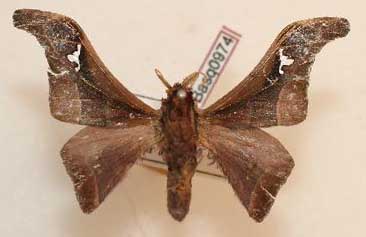Holocerina smilax basquini
hol-os-ser-EE-nuhmSMYE-laxmBAS-kwin-eye
Darge, 1986

Holocerina smilax basquini male, Bold
TAXONOMY:Superfamily: Bombycoidea Latreille, 1802 |
"Moon River" |
|
|
Updated as per Pinhey's Emperor Moths of South and South-Central Africa, 1972, January 7, 2006 Updated as per Bouyer's Catalogue of African Saturniidae, 1999 update, January 7, 2006 Updated as per personal communication with Thierry Bouyer, May 2006 |

Holocerina smilax basquini male, Bold
TAXONOMY:Superfamily: Bombycoidea Latreille, 1802 |
"Moon River" |
|
|
R
The pronunciation of scientific names is
troublesome for many. The "suggestion" at the top of the page is
merely a suggestion. It is based on commonly
accepted English pronunciation of Greek names and/or some
fairly well accepted "rules" for latinized scientific names.
The suggested pronunciations, on this page and on other pages,
are primarily put forward to assist those who hear with internal
ears as they read.
There are many collectors from different countries whose
intonations and accents would be different.
The species name, 'smilax', means "on wild asparagus creeper" according
to Pinhey, Emperor Moths of South-Central Africa, 1972.
The subspecies name 'basquini' is honourific for Basquin.